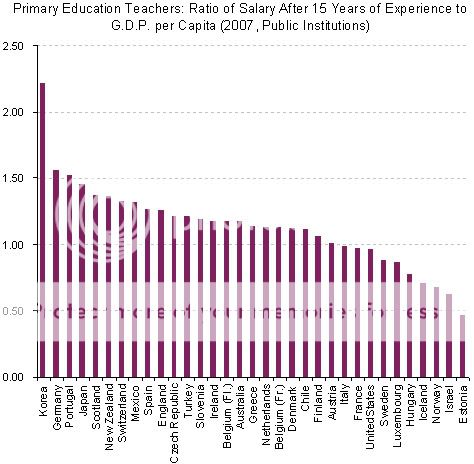Simple question. Maybe a simple answer.
Should teachers be paid purely based on years of experience?
If so, why?
If not, how would you revamp the salary schedules if you were in charge?
I pick "Other."
I don't mind teachers being paid on the years they've worked for the school system. After all, there's so many factors regarding education that it shouldn't be put all on the teachers. And considering the amount of crap they have to put up with, I don't mind it if they earn tenure.
On the other hand, I think we should have some reforms with regards to the public education system. These are:
1) Have school boards comprised of an equal number of teachers, administrators, children, and the parents of children. After all, I don't see why some politician who doesn't have a stake in the public education system should be allowed to be a representative on it and make policy for it.
2) Pay students to learn. We've poured so much money into computers and teacher salaries and programs and equipment that we have forgotten who we're doing this for: the children. So start pouring money into the children directly. Give them
a reason to apply themselves. I would do a 10% cut of all public education programs and salaries to administrators and use that money to set up a fund to pay
students for their performance. This way, students will apply themselves more and they can earn money themselves for things instead of having it given to them by the school. After all, the students won't care how much money the teachers get, so targeting teacher salaries is ignorant and stupid. Rather, target student salaries by creating them.
3) Create year-round school programs. Allow parents to opt their students in for summer school in order to review what they went through the year before and to help prepare them for what they'll learn in the next year. Students forget a lot of schooling during the summer months. Allow students the opportunity to go year round if their parents choose to in order to better their education.
4) Teach to the talents of the children. I keep hearing how children in the U.S. school system are below average in science and math when it comes to children in other school systems. Yeah, well, the thing is not every child is going to be good in all subjects. Some children just don't get math. It can take a while to understand things mathematically. As for science, kids will start taking more of an interest in science when we let them experiment on their own. Let kids do chemical reactions. Let kids cut animals up. Let kids make household explosives. That'll get them to understand practical applications of science. Until then, STFU about it and teach them the stuff they
do get, like literature, music, and art.
5) After school internships. Place high schoolers in internships for their chosen career path. Help young writers get positions in the news media or with a publishing company. Help young lawyers do work for established attorneys. Show young law enforcement officers how police procedures and forensics work. There's only so much of sitting in a desk and listening to a guy drone on that a child can learn from until they have to actually go out into the world and get some practical experience. Let them get a taste of the real world before we throw them out into it. Street smarts is just as important as book smarts.



